Related Research Articles

Louis XV, known as Louis the Beloved, was King of France from 1 September 1715 until his death in 1774. He succeeded his great-grandfather Louis XIV at the age of five. Until he reached maturity in 1723, the kingdom was ruled by his grand-uncle Philippe II, Duke of Orléans, as Regent of France. Cardinal Fleury was chief minister from 1726 until his death in 1743, at which time the king took sole control of the kingdom.
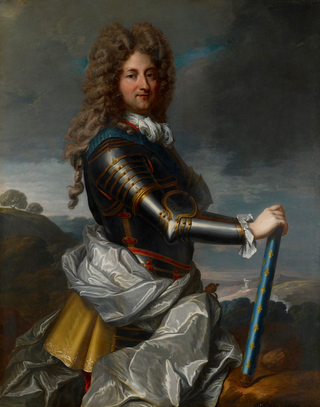
Philippe II, Duke of Orléans, was a French prince, soldier, and statesman who served as Regent of the Kingdom of France from 1715 to 1723. He is referred to in French as le Régent. He was the son of Monsieur Philippe I, Duke of Orleans, and Madame Elisabeth Charlotte, Duchess of Orléans. Born at his father's palace at Saint-Cloud, he was known from birth by the title of Duke of Chartres.
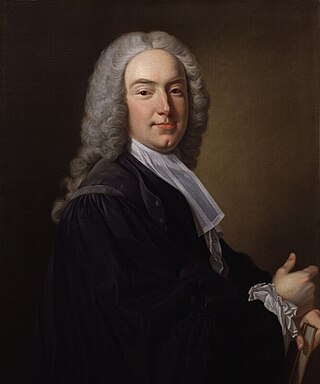
William Murray, 1st Earl of Mansfield,, was a British judge, politician, lawyer, and peer best known for his reforms to English law. Born in Scone Palace, Perthshire, to a family of Scottish nobility, he was educated in Perth before moving to London at the age of 13 to study at Westminster School. Accepted into Christ Church, Oxford, in May 1723, Mansfield graduated four years later and returned to London, where he was he was called to the Bar by Lincoln's Inn in November 1730 and quickly gained a reputation as an excellent barrister.
Monsieur is an honorific title that was used to refer to or address the eldest living brother of the king in the French royal court. It has now become the customary French title of respect and term of address for a French-speaking man, corresponding to such English titles as Mr. or sir.

Louis Henri, Duke of Bourbon, was a French nobleman and politician who served as Prime Minister of France from 1723 to 1726. As a member of the reigning House of Bourbon, he was a prince du sang.
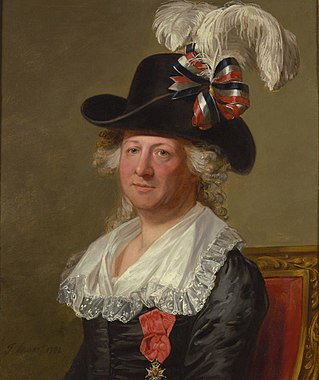
Charlotte d'Éon de Beaumont or Charles d'Éon de Beaumont, usually known as the Chevalière d'Éon or the Chevalier d'Éon, was a French diplomat, spy, and soldier. D'Éon fought in the Seven Years' War, and spied for France while in Russia and England. D'Éon had androgynous physical characteristics and natural abilities as a mimic and a spy. D'Éon appeared publicly as a man and pursued masculine occupations for 49 years, although during that time, d'Éon successfully infiltrated the court of Empress Elizabeth of Russia by presenting as a woman. Starting in 1777, d'Éon lived as a woman and was officially recognized as a woman by King Louis XVI.
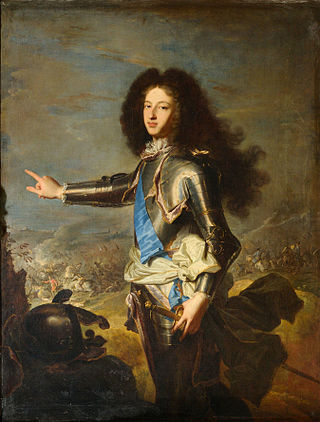
Louis, Dauphin of France, Duke of Burgundy, was the eldest son of Louis, Grand Dauphin, and Maria Anna Victoria of Bavaria and grandson of the reigning French king, Louis XIV. He was known as the "Petit Dauphin" to distinguish him from his father. When his father died in April 1711, the Duke of Burgundy became the official Dauphin of France. He never reigned, as he died in 1712 while his grandfather was still on the throne. Upon the death of Louis XIV in 1715, the Duke of Burgundy's third son became Louis XV.

Fils de France was the style and rank held by the sons of the kings and dauphins of France. A daughter was known as a fille de France.
The King's Secret refers to the secret diplomatic channels used by King Louis XV of France during his reign. For a period of over twenty years, Louis XV split his diplomacy into official and secret channels, the latter designed to advance Louis XV's personal interests at times at odds with official French policy.

Évrard Titon du Tillet is best known for his important biographical chronicle, Le Parnasse françois, composed of brief anecdotal lives of famous French poets and musicians of his time, under the reign of Louis XIV and the Régence.

Le Chevalier D'Eon is a Japanese anime television series produced by Production I.G based on an original story by Tow Ubukata. The anime originally aired in Japan on WOWOW from August 19, 2006, to February 2, 2007. The story has also been adapted into a manga series written by Tow Ubukata and illustrated by Kiriko Yumeji, which was first published in 2005. The title character is loosely based on the historical figure Chevalier d'Éon, who lived in the middle of 18th-century, pre-Revolutionary France under the reign of Louis XV.
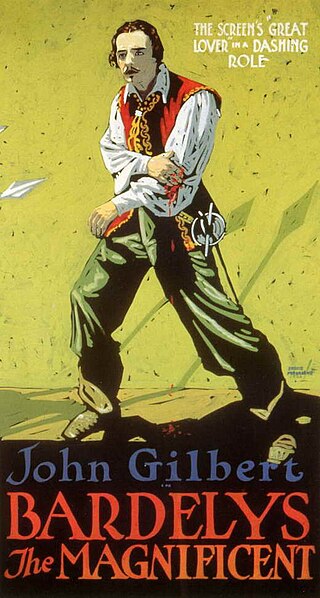
Bardelys the Magnificent is a 1926 American silent romantic film directed by King Vidor and starring John Gilbert and Eleanor Boardman. The film is based on the 1906 novel of the same title by Rafael Sabatini. It was the second film of the 19-year-old John Wayne, who had a minor role.
Landmark Cases in the Law of Contract (2008) is a book by Charles Mitchell and Paul Mitchell, which outlines the key cases in English contract law.

Carter v Boehm (1766) 3 Burr 1905 is a landmark English contract law case, in which Lord Mansfield established the duty of utmost good faith or uberrimae fidei in insurance contracts.
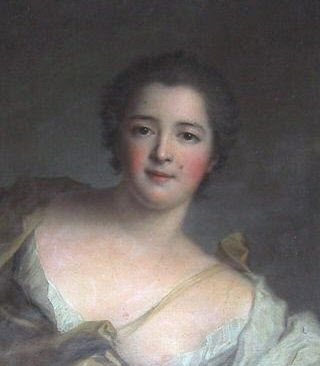
Diane Adélaïde de Mailly-Nesle, Duchesse de Lauraguais was the third of the five famous de Nesle sisters, four of whom would become the mistress of King Louis XV of France. She was his mistress on and off from 1742 to 1745.
James Gabriel Huquier, originally Jacques-Gabriel (1725–1805) was a portrait-painter and engraver. He was the son of the roccoco engraver Gabriel Huquier and his wife Marie-Ann (Desvignes). One of Huquier's subjects was Chevalier d'Eon, an early transvestite.

Beaumarchais is a 1996 French biopic film directed by Édouard Molinaro and starring Fabrice Luchini, Manuel Blanc and Sandrine Kiberlain. The film is based on the life of the French playwright, financier and spy Pierre Beaumarchais, depicting his activities during the American War of Independence and his authorship of the Figaro trilogy of plays. It was adapted from a play by Sacha Guitry.
Sir Alexander Peter Mackenzie Douglas, Baron of Kildin or Alexandre-Pierre de Mackensie-Douglas (fr.) or Alexandre Pierre Mackenzie, baron de Kildin, chevalier Douglass (1713-1765) was a Jacobite in French service.
References
- Warren Swain, in C Mitchell and P Mitchell, Landmark Cases in the Law of Contract (2008)
- Gary Kates, Monsieur d'Eon Is a Woman (1995) Basic Books, ISBN 0-465-04761-0